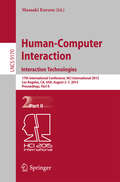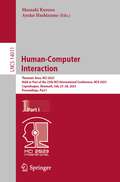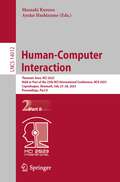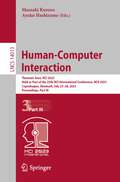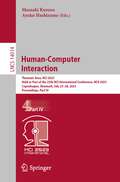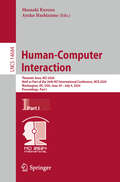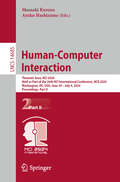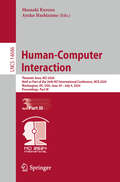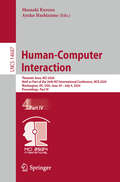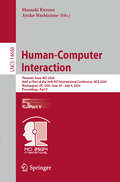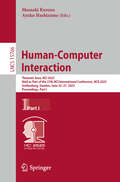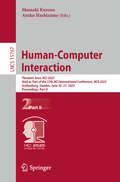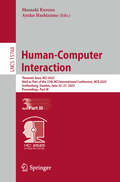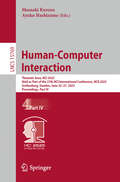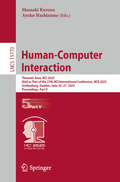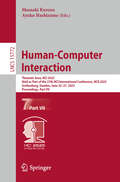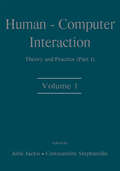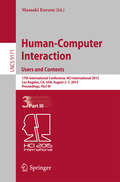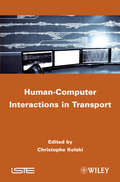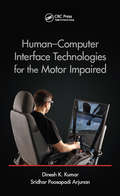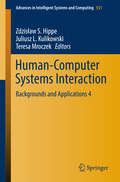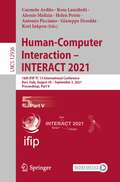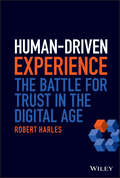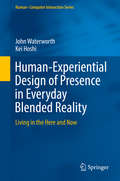- Table View
- List View
Human-Computer Interaction: Interaction Technologies
by Masaaki KurosuThe 3-volume set LNCS 9169, 9170, 9171 constitutes the refereed proceedings of the 17th International Conference on Human-Computer Interaction, HCII 2015, held in Los Angeles, CA, USA, in August 2015. The total of 1462 papers and 246 posters presented at the HCII 2015 conferences was carefully reviewed and selected from 4843 submissions. These papers address the latest research and development efforts and highlight the human aspects of design and use of computing systems. The papers in LNCS 9170 are organized in topical sections on gesture and eye-gaze based interaction; touch-based and haptic interaction; natural user interfaces; adaptive and personalized interfaces; distributed, migratory and multi-screen user interfaces; games and gamification; HCI in smart and intelligent environments.
Human-Computer Interaction: Thematic Area, HCI 2023, Held as Part of the 25th HCI International Conference, HCII 2023, Copenhagen, Denmark, July 23–28, 2023, Proceedings, Part I (Lecture Notes in Computer Science #14011)
by Masaaki Kurosu Ayako HashizumeThe four-volume set LNCS 14011, 14012, 14013, and 14014 constitutes the refereed proceedings of the Human Computer Interaction thematic area of the 25th International Conference on Human-Computer Interaction, HCII 2023, which took place in Copenhagen, Denmark, in July 2023. A total of 1578 papers and 396 posters have been accepted for publication in the HCII 2023 proceedings from a total of 7472 submissions. The papers included in the HCI 2023 volume set were organized in topical sections as follows: Part I: Design and evaluation methods, techniques and tools; interaction methods and techniques; Part II: Children computer interaction; emotions in HCI; and understanding the user experience; Part III: Human robot interaction; chatbots and voice-based interaction; interacting in the metaverse; Part IV: Supporting health, quality of life and everyday activities; HCI for learning, culture, creativity and societal impact.
Human-Computer Interaction: Thematic Area, HCI 2023, Held as Part of the 25th HCI International Conference, HCII 2023, Copenhagen, Denmark, July 23–28, 2023, Proceedings, Part II (Lecture Notes in Computer Science #14012)
by Masaaki Kurosu Ayako HashizumeThe four-volume set LNCS 14011, 14012, 14013, and 14014 constitutes the refereed proceedings of the Human Computer Interaction thematic area of the 25th International Conference on Human-Computer Interaction, HCII 2023, which took place in Copenhagen, Denmark, in July 2023. A total of 1578 papers and 396 posters have been accepted for publication in the HCII 2023 proceedings from a total of 7472 submissions. The papers included in the HCI 2023 volume set were organized in topical sections as follows: Part I: Design and evaluation methods, techniques and tools; interaction methods and techniques; Part II: Children computer interaction; emotions in HCI; and understanding the user experience; Part III: Human robot interaction; chatbots and voice-based interaction; interacting in the metaverse; Part IV: Supporting health, quality of life and everyday activities; HCI for learning, culture, creativity and societal impact.
Human-Computer Interaction: Thematic Area, HCI 2023, Held as Part of the 25th HCI International Conference, HCII 2023, Copenhagen, Denmark, July 23–28, 2023, Proceedings, Part III (Lecture Notes in Computer Science #14013)
by Masaaki Kurosu Ayako HashizumeThe four-volume set LNCS 14011, 14012, 14013, and 14014 constitutes the refereed proceedings of the Human Computer Interaction thematic area of the 25th International Conference on Human-Computer Interaction, HCII 2023, which took place in Copenhagen, Denmark, in July 2023. A total of 1578 papers and 396 posters have been accepted for publication in the HCII 2023 proceedings from a total of 7472 submissions. The papers included in the HCI 2023 volume set were organized in topical sections as follows: Part I: Design and evaluation methods, techniques and tools; interaction methods and techniques; Part II: Children computer interaction; emotions in HCI; and understanding the user experience; Part III: Human robot interaction; chatbots and voice-based interaction; interacting in the metaverse; Part IV: Supporting health, quality of life and everyday activities; HCI for learning, culture, creativity and societal impact.
Human-Computer Interaction: Thematic Area, HCI 2023, Held as Part of the 25th HCI International Conference, HCII 2023, Copenhagen, Denmark, July 23–28, 2023, Proceedings, Part IV (Lecture Notes in Computer Science #14014)
by Masaaki Kurosu Ayako HashizumeThe four-volume set LNCS 14011, 14012, 14013, and 14014 constitutes the refereed proceedings of the Human Computer Interaction thematic area of the 25th International Conference on Human-Computer Interaction, HCII 2023, which took place in Copenhagen, Denmark, in July 2023. A total of 1578 papers and 396 posters have been accepted for publication in the HCII 2023 proceedings from a total of 7472 submissions. The papers included in the HCI 2023 volume set were organized in topical sections as follows: Part I: Design and evaluation methods, techniques and tools; interaction methods and techniques; Part II: Children computer interaction; emotions in HCI; and understanding the user experience; Part III: Human robot interaction; chatbots and voice-based interaction; interacting in the metaverse; Part IV: Supporting health, quality of life and everyday activities; HCI for learning, culture, creativity and societal impact.
Human-Computer Interaction: Thematic Area, HCI 2024, Held as Part of the 26th HCI International Conference, HCII 2024, Washington, DC, USA, June 29 – July 4, 2024, Proceedings, Part I (Lecture Notes in Computer Science #14684)
by Masaaki Kurosu Ayako HashizumeThis five-volume set LNCS 14684-14688 constitutes the refereed proceedings of the Human Computer Interaction thematic area of the 26 International Conference on Human-Computer Interaction, HCII 2024, held in Washington, DC, USA, during June 29 – July 4, 2024. The total of 1271 papers and 309 posters included in the HCII 2024 proceedings was carefully reviewed and selected from 5108 submissions. The VAMR 2024 proceedings were organized in the following topical sections: Part I: HCI Theory and Design and Evaluation Methods and Tools; Emotions in HCI. Part II: Human-Robot Interaction; Child-Computer Interaction. Part III: HCI for Mental Health and Psychological Wellbeing; HCI in Healthcare. Part IV: HCI, Environment and Sustainability; Design and User Experience Evaluation Case Studies. Part V: Multimodality and Natural User Interfaces; HCI, AI, Creativity, Art and Culture.
Human-Computer Interaction: Thematic Area, HCI 2024, Held as Part of the 26th HCI International Conference, HCII 2024, Washington, DC, USA, June 29 – July 4, 2024, Proceedings, Part II (Lecture Notes in Computer Science #14685)
by Masaaki Kurosu Ayako HashizumeThis five-volume set LNCS 14684-14688 constitutes the refereed proceedings of the Human Computer Interaction thematic area of the 26 International Conference on Human-Computer Interaction, HCII 2024, held in Washington, DC, USA, during June 29 – July 4, 2024. The total of 1271 papers and 309 posters included in the HCII 2024 proceedings was carefully reviewed and selected from 5108 submissions. The VAMR 2024 proceedings were organized in the following topical sections: Part I: HCI Theory and Design and Evaluation Methods and Tools; Emotions in HCI. Part II: Human-Robot Interaction; Child-Computer Interaction. Part III: HCI for Mental Health and Psychological Wellbeing; HCI in Healthcare. Part IV: HCI, Environment and Sustainability; Design and User Experience Evaluation Case Studies. Part V: Multimodality and Natural User Interfaces; HCI, AI, Creativity, Art and Culture.
Human-Computer Interaction: Thematic Area, HCI 2024, Held as Part of the 26th HCI International Conference, HCII 2024, Washington, DC, USA, June 29 – July 4, 2024, Proceedings, Part III (Lecture Notes in Computer Science #14686)
by Masaaki Kurosu Ayako HashizumeThis five-volume set LNCS 14684-14688 constitutes the refereed proceedings of the Human Computer Interaction thematic area of the 26 International Conference on Human-Computer Interaction, HCII 2024, held in Washington, DC, USA, during June 29 – July 4, 2024. The total of 1271 papers and 309 posters included in the HCII 2024 proceedings was carefully reviewed and selected from 5108 submissions. The VAMR 2024 proceedings were organized in the following topical sections: Part I: HCI Theory and Design and Evaluation Methods and Tools; Emotions in HCI. Part II: Human-Robot Interaction; Child-Computer Interaction. Part III: HCI for Mental Health and Psychological Wellbeing; HCI in Healthcare. Part IV: HCI, Environment and Sustainability; Design and User Experience Evaluation Case Studies. Part V: Multimodality and Natural User Interfaces; HCI, AI, Creativity, Art and Culture.
Human-Computer Interaction: Thematic Area, HCI 2024, Held as Part of the 26th HCI International Conference, HCII 2024, Washington, DC, USA, June 29 – July 4, 2024, Proceedings, Part IV (Lecture Notes in Computer Science #14687)
by Masaaki Kurosu Ayako HashizumeThis five-volume set LNCS 14684-14688 constitutes the refereed proceedings of the Human Computer Interaction thematic area of the 26 International Conference on Human-Computer Interaction, HCII 2024, held in Washington, DC, USA, during June 29 – July 4, 2024. The total of 1271 papers and 309 posters included in the HCII 2024 proceedings was carefully reviewed and selected from 5108 submissions. The VAMR 2024 proceedings were organized in the following topical sections: Part I: HCI Theory and Design and Evaluation Methods and Tools; Emotions in HCI. Part II: Human-Robot Interaction; Child-Computer Interaction. Part III: HCI for Mental Health and Psychological Wellbeing; HCI in Healthcare. Part IV: HCI, Environment and Sustainability; Design and User Experience Evaluation Case Studies. Part V: Multimodality and Natural User Interfaces; HCI, AI, Creativity, Art and Culture.
Human-Computer Interaction: Thematic Area, HCI 2024, Held as Part of the 26th HCI International Conference, HCII 2024, Washington, DC, USA, June 29 – July 4, 2024, Proceedings, Part V (Lecture Notes in Computer Science #14688)
by Masaaki Kurosu Ayako HashizumeThis five-volume set LNCS 14684-14688 constitutes the refereed proceedings of the Human Computer Interaction thematic area of the 26 International Conference on Human-Computer Interaction, HCII 2024, held in Washington, DC, USA, during June 29 – July 4, 2024. The total of 1271 papers and 309 posters included in the HCII 2024 proceedings was carefully reviewed and selected from 5108 submissions. The VAMR 2024 proceedings were organized in the following topical sections: Part I: HCI Theory and Design and Evaluation Methods and Tools; Emotions in HCI. Part II: Human-Robot Interaction; Child-Computer Interaction. Part III: HCI for Mental Health and Psychological Wellbeing; HCI in Healthcare. Part IV: HCI, Environment and Sustainability; Design and User Experience Evaluation Case Studies. Part V: Multimodality and Natural User Interfaces; HCI, AI, Creativity, Art and Culture.
Human-Computer Interaction: Thematic Area, HCI 2025, Held as Part of the 27th HCI International Conference, HCII 2025, Gothenburg, Sweden, June 22–27, 2025, Proceedings, Part I (Lecture Notes in Computer Science #15766)
by Masaaki Kurosu Ayako HashizumeThis seven-volume set constitutes the refereed proceedings of the Human Computer Interaction thematic area of the 27th International Conference on Human-Computer Interaction, HCII 2025, held in Gothenburg, Sweden, during June 22–27, 2025. The HCI Thematic Area constitutes a forum for scientific research and addressing challenging and innovative topics in Human-Computer Interaction theory, methodology and practice, including, for example, novel theoretical approaches to interaction, novel user interface concepts and technologies, novel interaction devices, UI development methods, environments and tools, multimodal user interfaces, emotions in HCI, aesthetic issues, HCI and children, evaluation methods and tools, and many others.
Human-Computer Interaction: Thematic Area, HCI 2025, Held as Part of the 27th HCI International Conference, HCII 2025, Gothenburg, Sweden, June 22–27, 2025, Proceedings, Part II (Lecture Notes in Computer Science #15767)
by Masaaki Kurosu Ayako HashizumeThis seven-volume set constitutes the refereed proceedings of the Human Computer Interaction thematic area of the 27th International Conference on Human-Computer Interaction, HCII 2025, held in Gothenburg, Sweden, during June 22–27, 2025. The HCI Thematic Area constitutes a forum for scientific research and addressing challenging and innovative topics in Human-Computer Interaction theory, methodology and practice, including, for example, novel theoretical approaches to interaction, novel user interface concepts and technologies, novel interaction devices, UI development methods, environments and tools, multimodal user interfaces, emotions in HCI, aesthetic issues, HCI and children, evaluation methods and tools, and many others.
Human-Computer Interaction: Thematic Area, HCI 2025, Held as Part of the 27th HCI International Conference, HCII 2025, Gothenburg, Sweden, June 22–27, 2025, Proceedings, Part III (Lecture Notes in Computer Science #15768)
by Masaaki Kurosu Ayako HashizumeThis seven-volume set constitutes the refereed proceedings of the Human Computer Interaction thematic area of the 27th International Conference on Human-Computer Interaction, HCII 2025, held in Gothenburg, Sweden, during June 22–27, 2025. The HCI Thematic Area constitutes a forum for scientific research and addressing challenging and innovative topics in Human-Computer Interaction theory, methodology and practice, including, for example, novel theoretical approaches to interaction, novel user interface concepts and technologies, novel interaction devices, UI development methods, environments and tools, multimodal user interfaces, emotions in HCI, aesthetic issues, HCI and children, evaluation methods and tools, and many others.
Human-Computer Interaction: Thematic Area, HCI 2025, Held as Part of the 27th HCI International Conference, HCII 2025, Gothenburg, Sweden, June 22–27, 2025, Proceedings, Part IV (Lecture Notes in Computer Science #15769)
by Masaaki Kurosu Ayako HashizumeThis seven-volume set constitutes the refereed proceedings of the Human Computer Interaction thematic area of the 27th International Conference on Human-Computer Interaction, HCII 2025, held in Gothenburg, Sweden, during June 22–27, 2025. The HCI Thematic Area constitutes a forum for scientific research and addressing challenging and innovative topics in Human-Computer Interaction theory, methodology and practice, including, for example, novel theoretical approaches to interaction, novel user interface concepts and technologies, novel interaction devices, UI development methods, environments and tools, multimodal user interfaces, emotions in HCI, aesthetic issues, HCI and children, evaluation methods and tools, and many others.
Human-Computer Interaction: Thematic Area, HCI 2025, Held as Part of the 27th HCI International Conference, HCII 2025, Gothenburg, Sweden, June 22–27, 2025, Proceedings, Part V (Lecture Notes in Computer Science #15770)
by Masaaki Kurosu Ayako HashizumeThis seven-volume set constitutes the refereed proceedings of the Human Computer Interaction thematic area of the 27th International Conference on Human-Computer Interaction, HCII 2025, held in Gothenburg, Sweden, during June 22–27, 2025. The HCI Thematic Area constitutes a forum for scientific research and addressing challenging and innovative topics in Human-Computer Interaction theory, methodology and practice, including, for example, novel theoretical approaches to interaction, novel user interface concepts and technologies, novel interaction devices, UI development methods, environments and tools, multimodal user interfaces, emotions in HCI, aesthetic issues, HCI and children, evaluation methods and tools, and many others.
Human-Computer Interaction: Thematic Area, HCI 2025, Held as Part of the 27th HCI International Conference, HCII 2025, Gothenburg, Sweden, June 22–27, 2025, Proceedings, Part VI (Lecture Notes in Computer Science #15771)
by Masaaki Kurosu Ayako HashizumeThis seven-volume set constitutes the refereed proceedings of the Human Computer Interaction thematic area of the 27th International Conference on Human-Computer Interaction, HCII 2025, held in Gothenburg, Sweden, during June 22–27, 2025. The HCI Thematic Area constitutes a forum for scientific research and addressing challenging and innovative topics in Human-Computer Interaction theory, methodology and practice, including, for example, novel theoretical approaches to interaction, novel user interface concepts and technologies, novel interaction devices, UI development methods, environments and tools, multimodal user interfaces, emotions in HCI, aesthetic issues, HCI and children, evaluation methods and tools, and many others.
Human-Computer Interaction: Thematic Area, HCI 2025, Held as Part of the 27th HCI International Conference, HCII 2025, Gothenburg, Sweden, June 22–27, 2025, Proceedings, Part VII (Lecture Notes in Computer Science #15772)
by Masaaki Kurosu Ayako HashizumeThis seven-volume set constitutes the refereed proceedings of the Human Computer Interaction thematic area of the 27th International Conference on Human-Computer Interaction, HCII 2025, held in Gothenburg, Sweden, during June 22–27, 2025. The HCI Thematic Area constitutes a forum for scientific research and addressing challenging and innovative topics in Human-Computer Interaction theory, methodology and practice, including, for example, novel theoretical approaches to interaction, novel user interface concepts and technologies, novel interaction devices, UI development methods, environments and tools, multimodal user interfaces, emotions in HCI, aesthetic issues, HCI and children, evaluation methods and tools, and many others.
Human-Computer Interaction: Theory and Practice (part 1), Volume 1 (Human Factors and Ergonomics)
by Constantine Stephanidis Julie JackoThis four volume set provides the complete proceedings of the 10th International Conference on Human-Computer Interaction held June, 2003 in Crete, Greece. A total of 2,986 individuals from industry, academia, research institutes, and governmental agencies from 59 countries submitted their work for presentation at the conference. The papers address the latest research and development efforts, as well as highlight the human aspects of design and use of computing systems. Those accepted for presentation thoroughly cover the entire field of human-computer interaction, including the cognitive, social, ergonomic, and health aspects of work with computers. The papers also address major advances in knowledge and effective use of computers in a variety of diversified application areas, including offices, financial institutions, manufacturing, electronic publishing, construction, health care, and disabled and elderly people.
Human-Computer Interaction: Users and Contexts
by Masaaki KurosuThe 3-volume set LNCS 9169, 9170, 9171 constitutes the refereed proceedings of the 17th International Conference on Human-Computer Interaction, HCII 2015, held in Los Angeles, CA, USA, in August 2015. The total of 1462 papers and 246 posters presented at the HCII 2015 conferences was carefully reviewed and selected from 4843 submissions. These papers address the latest research and development efforts and highlight the human aspects of design and use of computing systems. The papers in LNCS 9171 are organized in topical sections on interaction and quality for the web and social media; HCI in business, industry and innovation; societal and cultural impact of technology; user studies.
Human-Computer Interactions in Transport
by Christophe KolskiThe human-computer interactions are more and more present in our everyday life, and lead to many conceptual and methodological problems for the designers and evaluators of interactive systems. This book is about Human-Computer Interaction in Transport domain, in which the traveler becomes a user of information systems, particularly before and during the travel(s). This book will focus on traveler information and personalized systems, using a human-centered design approach.
Human-Computer Interface Technologies for the Motor Impaired (Rehabilitation Science In Practice Ser.)
by Dinesh K. Kumar Sridhar Poosapadi ArjunanHuman Computer Interface Technologies for the Motor Impaired examines both the technical and social aspects of human computer interface (HCI). Written by world-class academic experts committed to improving HCI technologies for people with disabilities, this all-inclusive book explores the latest research, and offers insight into the current limitat
Human-Computer Systems Interaction
by Zdzisław S. Hippe Juliusz L. Kulikowski Teresa MroczekFor the last decades, as the computer technology has been developing, the importance of human-computer systems interaction problems was growing. This is not only because the computer systems performance characteristics have been im-proved but also due to the growing number of computer users and of their expectations about general computer systems capabilities as universal tools for human work and life facilitation. The early technological problems of man-computer information exchange - which led to a progress in computer programming languages and input/output devices construction - have been step by step dominated by the more general ones of human interaction with-and-through computer systems, shortly denoted as H-CSI problems. The interest of scientists and of any sort specialists to the H-CSI problems is very high as it follows from an increasing number of scientific conferences and publications devoted to these topics. The present book contains selected papers concerning various aspects of H-CSI. They have been grouped into five Parts: I. General H-CSI problems (7 papers), II. Disabled persons helping and medical H-CSI applications (9 papers), III. Psychological and linguistic H-CSI aspects (9 papers), IV. Robots and training systems (8 papers), V. Various H-CSI applications (11 papers).
Human-Computer-Interaction – INTERACT 2021: 18th IFIP TC 13 International Conference, Bari, Italy, August 30 – September 3, 2021, Proceedings, Part V (Lecture Notes in Computer Science #12936)
by Helen Petrie Alessio Malizia Carmelo Ardito Rosa Lanzilotti Antonio Piccinno Giuseppe Desolda Kori InkpenThe five-volume set LNCS 12932-12936 constitutes the proceedings of the 18th IFIP TC 13 International Conference on Human-Computer Interaction, INTERACT 2021, held in Bari, Italy, in August/September 2021.The total of 105 full papers presented together with 72 short papers and 70 other papers in these books was carefully reviewed and selected from 680 submissions. The contributions are organized in topical sections named: Part I: affective computing; assistive technology for cognition and neurodevelopment disorders; assistive technology for mobility and rehabilitation; assistive technology for visually impaired; augmented reality; computer supported cooperative work. Part II: COVID-19 & HCI; croudsourcing methods in HCI; design for automotive interfaces; design methods; designing for smart devices & IoT; designing for the elderly and accessibility; education and HCI; experiencing sound and music technologies; explainable AI. Part III: games and gamification; gesture interaction; human-centered AI; human-centered development of sustainable technology; human-robot interaction; information visualization; interactive design and cultural development. Part IV: interaction techniques; interaction with conversational agents; interaction with mobile devices; methods for user studies; personalization and recommender systems; social networks and social media; tangible interaction; usable security. Part V: user studies; virtual reality; courses; industrial experiences; interactive demos; panels; posters; workshops. The chapter ‘Stress Out: Translating Real-World Stressors into Audio-Visual Stress Cues in VR for Police Training’ is open access under a CC BY 4.0 license at link.springer.com. The chapter ‘WhatsApp in Politics?! Collaborative Tools Shifting Boundaries’ is open access under a CC BY 4.0 license at link.springer.com.
Human-Driven Experience: The Battle for Trust in the Digital Age
by Robert HarlesExplore the human side of the latest digital technologies and trends In Human-Driven Experience: The Battle for Trust in a Digital Age, veteran digital strategist delivers a must-read exploration of how to capture the attention of consumers whose tolerance for inauthenticity is at an all-time low. In the book, you&’ll discover ways to harness the sometimes whiplash-inducing pace of change in the marketplace to accelerate innovation in your own organisation. The author discusses the need for increased mobility between functional areas like information technology, digital and marketing and how privacy and security must become essential components of your brand's promise to consumers. You'll also find: Strategies for creating end-to-end digital experiences that hit home with consumers Techniques for rising above the ever-loudening din of inauthentic advertising and marketing that has made consumers increasingly sceptical of new and established brands Incisive discussions of how data is becoming ever more targeted, identifiable and real-time – and what to do about it Perfect for executives, managers and other business leaders, Human-Driven Experience is also a can't-miss resource for marketing, digital and IT professionals looking for ways to make sense of a consumer landscape that's been turned upside down by digital technologies.
Human-Experiential Design of Presence in Everyday Blended Reality
by John Waterworth Kei HoshiThis book explores how our lives and social interactions have become split between two intertwined, but not integrated, realities: the physical and the digital. Our sense of presence in the here and now has become fragmented, and yet earlier design approaches reinforced the problem, rather than leading to improvements. The authors address these issues by laying out a new human computer interaction (HCI) design approach - human-experiential design - rooted in a return to first principles of how people understand the world, both consciously and unconsciously. The application of this approach to the design of blended reality spaces is described in detail. Examples and scenarios of designing them to overcome the problems inherent in a variety of mixed reality settings are provided. Human-Experiential Design of Presence in Everyday Blended Reality will appeal to undergraduate and graduate students and researchers in interaction design, psychology, HCI and computer application studies, as well as practicing interaction designers and computer professionals. It will also be of interest to communication, media and urban design students, and to all readers with an interest in the technology-mediated future.
